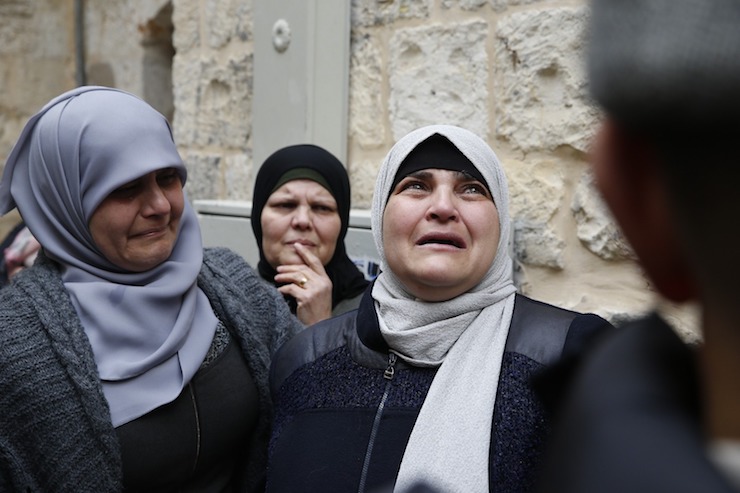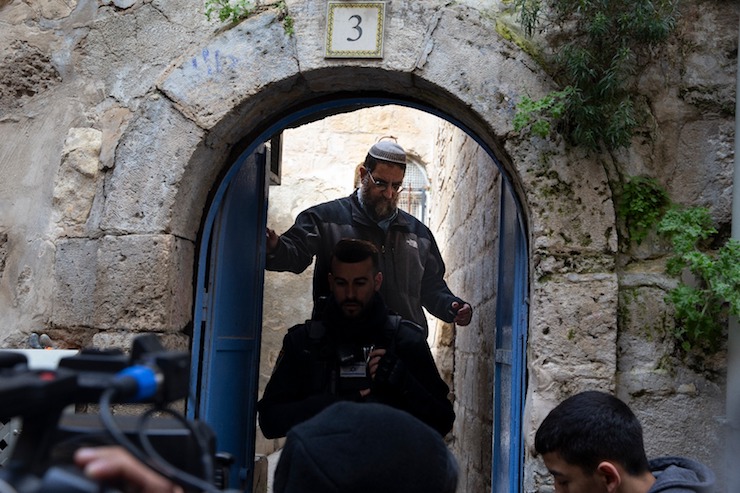The Abu Assab family home, located in Jerusalem’s Old City, is expected to be occupied by right-wing Jewish Israeli settlers. Nearly 200 Palestinian families in East Jerusalem are under threat of eviction by settler organizations.
By Aviv Tatarsky

Israeli police evicted a Palestinian family from their home in the Muslim Quarter of Jerusalem’s Old City Sunday morning. The home is expected to be occupied by right-wing Jewish Israeli settlers in the near future.
The Abu Assab family had lived in the home for nearly 70 years. Seven members of the family, including a four-year-old child, were evicted on Sunday, with police arresting two other family members. They will now be forced to find a new place to live.
The Abu Assab family originally lived in the Baka neighborhood West Jerusalem, from which they were expelled by Israeli forces during the 1948 war. In the 1950s, the government of Jordan, which controlled the West Bank and East Jerusalem at the time, settled the family in a home in the Old City, which had been owned by Jews before the war.
After the 1967 war, when Israel occupied and illegally annexed East Jerusalem, the family continued to live in the home as protected tenants. Five years ago, a settler organization initiated eviction proceedings against the family, and an Israeli court ultimately ordered their eviction.
Under a 1970 Israeli law, Israeli Jews are allowed to sue to reclaim properties they owned in East Jerusalem that they were forced to abandon in 1948. Palestinians who owned properties in West Jerusalem and Israel who fled in 1948, however, have no legal avenue for reclaiming those properties — even if they live in Israeli-controlled territory today.
Thus, while the original Jewish owners, or in this case their settler proxies, were allowed seek the Abu Assab family’s eviction from their home, the Abu Assab family was unable to ask the same court to allow it to return to its original home in West Jerusalem.
Police have evicted a number of other Palestinian families from the exact same street, Aqbat al-Khaldia, using the same legal mechanisms. Other families are still battling eviction attempts in Israeli courts.
In the coming weeks around 40 members of the Sabag family are expected to be evicted from their home in the Sheikh Jarrah neighborhood of East Jerusalem, while another 70 Palestinian families in the neighborhood are facing eviction proceedings. In total, Jewish settler organizations are working to evict some 200 families in Sheikh Jarrah, the Muslim Quarter of the Old City, and Batan al-Hilwe.

When Jewish settlers move into Palestinian neighborhoods, they almost always bring with them armed guards to stand guard on their rooftops and outside their doors, a dynamic that has a detrimental influence on entire neighborhoods. Day to day life is disrupted, with residents facing pressure seemingly designed to push them out of their homes.
Israeli authorities have various ways of abetting that effort, from the law allowing only Jews to reclaim property, to funding private security guards for the settlers who move in to their properties, to funding tourism initiatives that strengthen the image of those settlements vis-à-vis the Israeli and international public.
Aviv Tatarsky is a researcher for Ir Amim, an Israeli NGO that works for an equitable Jerusalem. This post was originally published in Hebrew on Local Call. Read it here.
